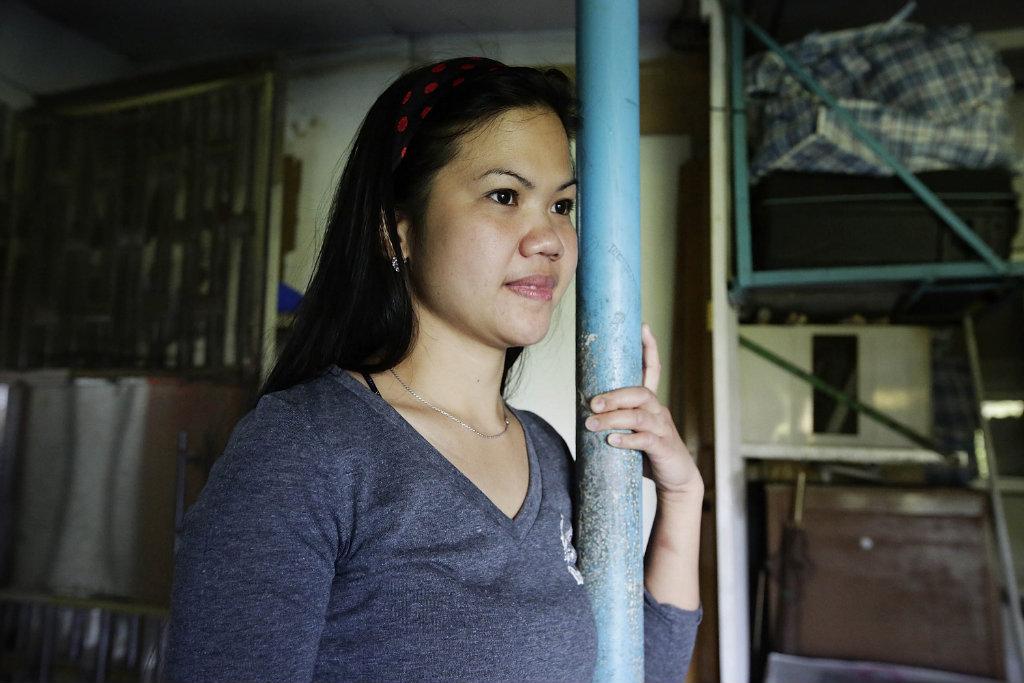More than sexual exploitation, human trafficking is forced labor
Domestic worker from the Phillipines, Bea stands at the entrance to the illegal boarding house where she lives in Pokfulam on Jan. 26, 2014 in Hong Kong. The domestic help systems in Hong Kong and other Asian and Middle Eastern countries are under scrutiny following recent cases of abuse.
MINNEAPOLIS — Sex trafficking gets a lot of attention, as it should. It’s a horrific crime. But trafficking in forced labor is also a grave abuse that has even more victims.
In 2012, the International Labor Organization (ILO) estimated that worldwide there were 14.2 million victims of forced labor compared with 4.5 million victims of forced sexual exploitation. Migrant domestic workers, for example, are at high risk of being trafficked into forced labor, but their stories rarely make the headlines.
Some governments have a blind spot when it comes to trafficking into forced labor. The United Arab Emirates (UAE) is one example.
The UAE considers forced labor a crime, but its anti-trafficking efforts, including shelters and public awareness campaigns, focus far more on sex trafficking than on trafficking into forced labor. In fact, the country’s main agency dealing with trafficking said in its 2013-14 that “the UAE — with expatriates making up about 85 percent of its population — believes that labor issues should not be linked to human trafficking, and should be treated separately.”
With an estimated 7.3 million migrant workers in the country, the UAE should have immigration policies and labor laws that protect foreign workers’ rights and reduce the risk of trafficking. Instead, they have a visa sponsorship system that fosters conditions for trafficking into forced labor. And while the labor law covers some migrant workers, it explicitly excludes domestic workers.
The UAE’s visa sponsorship system, known as kafala, ties domestic workers to individual employers. They can’t move to a new job before the end of their contract without the employer’s consent. This system — together with deceptive recruitment practices, the common employer practice of confiscating workers’ passports and exploitative working conditions — create a “perfect storm” for trafficking.
My colleague and I interviewed 99 domestic workers in the UAE, including some who were trafficked, for a new Human Rights Watch report. The women reported a range of abuses. Recruiters made false promises. Employers often didn’t pay the women’s wages on time, and some didn’t pay at all. Many employers confiscated the women’s passports and confined them to the households where they worked. The women worked long hours with no rest, and some were deprived of food. Some employers inflicted psychological and physical abuse — including sexual abuse.
One example is Mabel (whose name is changed for her protection), who left an office job in the Philippines for what she believed would be more lucrative work in the United Arab Emirates. A labor recruitment agent in the Philippines duped Mabel with the promise of an office job in Dubai with good pay.
But when she arrived in the UAE, there was no office job. Instead, the agent in the UAE made her work as a nanny and housecleaner for a family with three children. Mabel said her employers took her passport and locked her in their home. She worked up to 20 hours each day with no rest periods, or even one day off, for 10 months. Her employers delayed paying her wages for three months at a time. After they started beating her, she pretended to take out the garbage one day and then ran.
At the same time as the UAE is falling short on addressing trafficking and forced labor concerns at home, it is getting more involved at the global level. In 2014, the country was elected to the International Labor Organization’s Governing Body, and is a donor to a UN anti-trafficking initiative.
If the UAE wants to be a major player on labor and trafficking at the global level, it needs to put its own house in order. It can start by ratifying key global treaties, including the 2014 protocol to the ILO forced labor convention of 1930, and the 2011 ILO Convention on Domestic Workers.
The UAE should reform its laws by doing away with its visa sponsorship system and adopting a law on domestic workers rights. It should expand its anti-trafficking programs beyond sex trafficking.
It is time to assist all victims of trafficking, not just those whose stories make the headlines.
Janet Walsh is deputy women’s rights director at Human Rights Watch. Follow her on Twitter at: @JanetHRW.
Every day, reporters and producers at The World are hard at work bringing you human-centered news from across the globe. But we can’t do it without you. We need your support to ensure we can continue this work for another year.
Make a gift today, and you’ll help us unlock a matching gift of $67,000!
